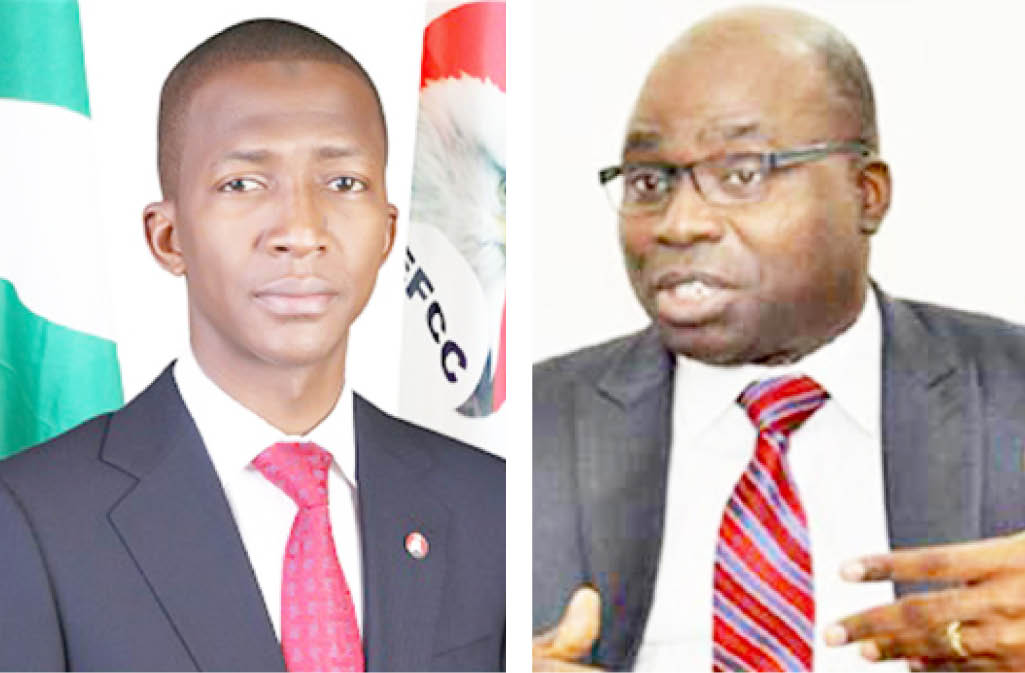The call to scrap EFCC and ICPC which has received some vociferous backing by prominent members of the bar is misconceived. In the first place and with all due respect to Olisa Agbakoba SAN, it is contradictory to argue that EFCC should not exist and also argue that the EFCC, as a creation of the National Assembly, does not have the power to interfere with the activities of the state government and, therefore, should only be restricted to the Federal Capital Territory. These two points of view cannot stand side by side.
In his words “EFCC is created by an Act of the National Assembly and cannot interfere with state government.” In reply to this, section 19 of the EFCC Act ascribes jurisdiction to the Federal High Court, the High Court of a State and the High Court of the Federal Capital Territory to try offenders under the Act notwithstanding to the contrary, anything under any other enactment. As provided for in section 1 (2) of the EFCC Act, the commission may sue and be sued in its corporate name. This provision empowers the commission to prosecute cases at the Federal High Court, the State High Court and the High Court of the Federal Capital territory. By implication the commission is empowered to prosecute financial crimes committed in any of Nigeria’s federating units.
It is also worthy to note that the EFCC is a special agency created specifically to tackle corruption. There is no gainsaying that the police have wide powers but the primary duty of the police is to maintain law and order in the society. Given the current trend in terms of corruption, and financial crimes, it is imperative that a special agency is dedicated to fighting corruption, this is a task the EFCC has largely been successful at carrying out. If one perceives duplicity or multiplicity of functions across the government agencies, there are ways to address the issue which could include amendment of the affected section rather that an outright call for scrapping of an agency such as EFCC which has played a vital role in safeguarding the economic interests of Nigeria and Nigerians.
The position that the EFCC Act is inconsistent with section 36(12) of the Constitution is also not tenable with all due respect to the learned silk. The functions of the Commission under the EFCC Act, is provided for under section 6 of the Act. The Act also creates several offences which are clearly defined and penalty expressly stipulated. Section 46 of the Act which is the interpretation section does not in any way contradict section 36(12) of the constitution.
- Female candidates brainstorm in Kaduna, hopeful of victory
- Hajj 2023: Kaduna launches pilgrims guide curriculum
A brief background to the enactment of the EFCC Act and other similar statutes is imperative. It is important to state that the Nigerian statutes were promulgated against the background that Nigeria is a signatory and member state of the United Nations Convention against Corruption (UNCAC) which has been adopted by the UN General Assembly in October 2003 and came into force in 2005.
Article 54 of UNCAC states:
Each State Party,…, shall, in accordance with its domestic law:…(C) consider taking such measures as may be necessary to allow confiscation of such property without a criminal conviction in cases in which the offender cannot be prosecuted by reason of death, flight, or absence or in other appropriate cases.
We could also make reference to the 2005 Commonwealth Expert Group on Asset Recovery & Repatriation also stated as follows:
Commonwealth countries that have yet to do so should promptly put in place strong and comprehensive legislations and procedures for criminal conviction based asset confiscation. This should include a power to confiscate in circumstances where the accused has absconded or died. Commonwealth countries should also put in place comprehensive legislations and procedures for non-conviction based assets confiscation.
The promulgation of a number of non-conviction based forfeiture provisions, is a direct attempt to tackle corruption in furtherance of the objectives and requirements of the United Nations Convention Against Corruption (UNCAC) as stated above. This may have been responsible for the promulgation of many penal legislations including but not limited to: Customs and Excise Management Act; the Economic and Financial Crimes Commission Establishment Act 2004; the Independent Corrupt Practices & Other Related Offences Act 2000; The National Agency for the Prohibition of Trafficking in Persons Act; The Money Laundering (Prohibition) Act 2011 as amended by the Money Laundering (Prohibition) (Amendment) Act 2012; and The Advance Fee Fraud and Other Fraud Related Offences Act, 2006.
Significantly, Nigeria is not the only country that has special agencies that focus on a particular aspect of law enforcement. For instance the UK, in addition to the police, has the Special Fraud Office (SFO) which was created by the Criminal Justice Act, 1987 to specifically fight fraud, bribery and corruption. The SFO also is a specialist prosecuting authority tackling the top level of serious or complex fraud, bribery and corruption. Similarly, in the United States, Federal Bureau of Investigation (FBI), which is distinct from the police, investigates a variety of criminal activity including terrorism, cybercrime, white collar crimes, public corruption, civil rights violations, and other major crimes.
Indeed, it is strange that eminent silk, Olisa Agbakoba is raising this issue all over again having participated as amicus curiae in the proceedings before the Supreme Court in the case of AG Ondo State vs AG Federation & 35 ORS (2002) 6SC (Part 1) at pages 1 – 195. In the said case, the revered late Chief F.R. A. Williams SAN led appearances for the Plaintiff while Chief O. Kumuyi and Awa U. Kalu SAN appeared for the 1st -2nd Defendants. Other counsel also represented the 3rd – 36th Defendants in the proceedings. Indeed, the case resolved all the issues that are now the basis of fresh agitation by the learned silk, Olisa Agbakoba SAN.
In the said case, the question of the extent to which the National Assembly can legislate for the peace, order and good government of the federation under section 4(2) came up for discussion. The main question was, whether the National Assembly had the power to validly enact the Corrupt Practices and Other Related Offences Act 2000 by virtue of its general power under section 4(2) bearing in mind the fact that corruption is not an item under the exclusive or concurrent legislative lists and was only mentioned under section 15(5) of Chapter II of the Constitution, which under section 6(6)(c) is stated to be non-justiciable.
The Supreme Court held:
“Now Section 4 subsection (2) of the Constitution provides that the National Assembly has the power to make laws for the peace, order and good government of the Federation with respect to any matter included in the Exclusive Legislative List. This means that the National Assembly is empowered to legislate under item 60 (a) for the purpose of establishing and regulating the ICPC for the Federation. This the National Assembly has done by enacting the Act.
The ICPC is, by the provisions of item 60 (a), to promote and enforce the observance of the fundamental objectives and Directive Principles of State Policy as contained under chapter II of the Constitution. The question is: how can the ICPC enforce the observance? Is it to use force? Is it to legislate or what? The ICPC cannot do either of these because the use of force or coercion in enforcing the observance will require legislation. The ICPC has no power to legislate. Only the National Assembly can legislate. The Constitution of India has similar provisions to ours on Directive Principles of State Policy in Part IV thereof. In the India case of Manggru v. Commissioners of Budget Municipality, (1951) 87 C.L.J. 369,, it was held that the Directive Principles require to be implemented by legislation, and so long as there is no law carrying out the policy laid down in a directive neither the State nor an individual can violate any existing law or legal right under colour of following a directive. See also the Shorter Constitution of India 12th Edition by Dr. D. D. Basu at pages 296-297….It is submitted that “Corruption” is not a subject under either the Exclusive or the Concurrent Legislative Lists and therefore being a residual matter , the National Assembly has no power to legislate upon it. This submission overlooks the provisions of Section 4 subsection (4) (b) of the Constitution which provides that the National Assembly has the power to legislate on any matter with respect to which it is empowered to make law in accordance with the provisions of the Constitution. Section 15 subsection (5) directs the National Assembly to abolish all corrupt practices and abuse of power. The question is: how can the National Assembly exercise such powers? It can only do so effectively by legislation. Item 67 under the Exclusive List read together with the provisions of Section 4 subsection (2) provide that the National Assembly is empowered to make law for the peace, order and good government of the Federation and any part thereof. It follows, therefore, that the National Assembly has the power to legislate against corruption and abuse of office even as it applies to persons not in authority under public or government office. For the aim of making law is to achieve the common good…”
It is clear from the above that the issues forming the basis of fresh agitation by eminent silk, Olisa Agbakoba had been previously resolved by the Supreme Court of Nigeria.
In conclusion, EFCC and ICPC have played a vital role in tackling corruption in Nigeria and should be applauded by all, even if there is still room for improvements. Calls to scrap EFCC and ICPC, in the interest of justice, safety, and protection of the Nigerian Economy should be ignored as such calls find no justification and accommodation in the body of our jurisprudence.
Shittu wrote from Abuja




